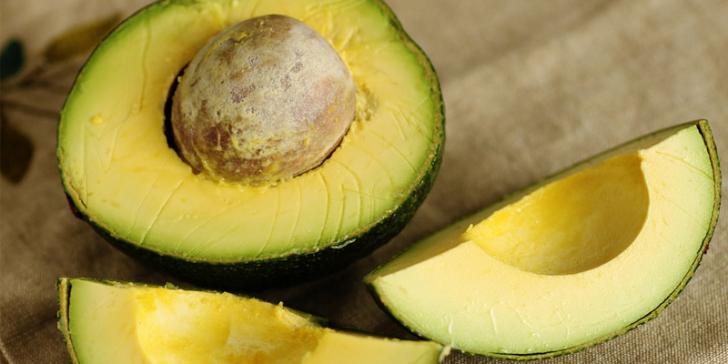Popular as ‘powerful nutrient booster’, it contains vitamins and minerals which bestows several health benefits. Avocado offers considerable amounts of minerals, vitamins and other nutrients with lesser calories. Research estimates that 30 g of avocado contains 50 calories and supplies several types of vitamins as well as minerals, making it a nutrient loaded choice.

Nutritional Chart of Avocado
Amount: 30g
Calories: 50
| Nutrients | Quantity |
|---|---|
| Sugar | 0 g |
| Carbohydrate | 3 g |
| Fat 4.5 g | |
| Dietary Fat | 2 g |
| Potassium | 150 g |
| Cholesterol | 0 mg |
| Sodium | 0 g |
| Vitamins and Minerals | |
| Vitamin E | 4% |
| Vitamin B6 | 4% |
| Vitamin C | 4% |
| Folate | 6% |
| Niacin | 2% |
| Manganese | 2% |
| Iron | 2% |
| Phosphorus | 2% |
Source: USDA National Nutrient Database for Standard Reference.
Major health benefits via nutrients found in Avocado
Provides required level of energy
FDA (Food and Drug Administration) Guidelines of Nutrition shares that calories supplied by food provides energy to your body. FDA recommends that getting 100 calories from your diet is moderate and avocado supplies 50 calories while consuming 30 g. Thus, it is considered good nutrient choice for getting required level of energy.
Weight management

Carbohydrate is mainly blamed for gaining weight. It is divided into 3 divisions- Sugar, Fiber and Starch. If the level of carbohydrate is consumed in moderate amount then, it helps in preventing different disease including Type 2 Diabetes, obesity and more. USDA (United States Department of Agriculture) mentions that 30 g of avocado includes 0g of sugar and just 2 g of dietary fiber. In total, it consists of 3 g of carbohydrate.Therefore, consuming avocado in a moderate amount provides energy while maintaining weight.
Research
The fiber in avocados also maintains the function of digestion, makes intestines healthy and helps maintain weight, according to the Mayo Clinic.
Helps to maintain cholesterol level
Cholesterol is the main reason behind heart diseases and 30 g avocado contains 0mg cholesterol, so theres no risk of heart disease. US Department of Agriculture (USDA) National Nutrient Database for Standard Reference also mentions that 30 g avocado contains 4.5 g of fat, to be specific -3 g of monounsaturated fat. It is actually good for your body as it helps to reduce bad cholesterol level in our body.
Research
Avocados are filled with poly and mono unsaturated fats, which may maintain blood cholesterol levels and lessen risk for heart disease, according to a dietitian, Anne Mauney in Washington, D.C.
Maintains blood pressure

According to the author of Nutrition and Life, sodium chloride is always seen as the major factor for high blood pressure level. Reducing the amount of sodium can certainly minimize the risks of higher blood pressure. As avocado contains less sodium amount, it also lessens the risk of high blood pressure in the body.
Prevents Several Disease
Potassium helps to keep the human organs in good condition. Deficiency in potassium may lead to different health conditions like- fatigue, muscle weakness, abnormal heartbeat, anemia, severe headaches etcetera. 30g of avocado holds 150 mg of potassium which is the healthy amount to keep the body healthy and disease free. Also the amount of manganese found in avocado will help in proper brain function.
Reduces Depression
Folate limits the blood flow to brain, allowing neurotransmitter activities in brain and helps releasing happy hormones. As avocados contain 6% of Folate in 30g, it helps reduce the risks of depression. Research has also found that women consuming less quantity of folate can maximize the risks of breast cancer.
Maintains blood sugar level
Niacin also known as vitamin B3 is a vital vitamin necessary for processing body and helps to regulate blood sugar levels. Lack of niacin will result in different health problems like diarrhea, dementia, inflammation of the mouth, dermatitis, amnesia etcetera. Every 30 g of Avocado supplies 2% of niacin which helps to get rid of such problems.
Prevents Heart Diseases

When the levels of the amino acid named homocysteine found in blood plasma increases, it maximizes the risk of heart disease. If vitamin B6 is consumed in proper amount it helps to prevent heart diseases maintaining the level of amino acid, homocysteine. As per USDA, 30 g avocado contains 4% of vitamin B6.
Research
According to one of the researches published in Nutrition Journal in 2013, avocados were linked for reducing the risk of coronary artery disease, stroke and diabetes.
Beauty Benefits
Reduces Wrinkles and Dark spots
Consuming avocado or applying it topically helps reduce wrinkles and dark spots as it is filled with necessary vitamins and antioxidants. Also, avocado works as a sunscreen that protects your skin from UV rays.
Research
The vitamin C and vitamin E present in avocados nourishes your skin and helps in getting glowing skin, according to the Linus Pauling Institute at Oregon State University.
Other nutrients found in Avocado
|
Nutrients |
Includes |
Function |
|---|---|---|
|
Phytosterols |
Beta-sitosterol, Campesterol and Stigmasterol |
These Phytonutrients helps prevent heart disease, high cholesterol, common cold, rheumatoid arthritis, tuberculosis, cervical cancer, asthma, bronchitis, migraine headache etc. |
|
Carotenoids |
Beta-carotene, lutein, Alpha-carotene neochrome, neoxanthin, beta-cryptoxanthin, chrysanthemaxanthin, zeaxanthin, and violaxanthin |
These antioxidants found in avocado makes the fruit highly anti-inflammatory and aids in reducing the risk of degenerative and inflammatory disorders. |
|
Flavonoids |
Epigallocatechin 3-0-gallate and epicatechin |
These effective antioxidant helps maintain cholesterol levels. |
Avocado supplies moderate amount of calories and healthy amount of vitamins, minerals as well as other nutrients which help to keep human body in good condition. Yet, it should be consumed in moderate amount and one has to be careful while consuming the fruit during pregnancy. People with hypersensitivity should avoid the fruit.